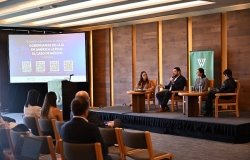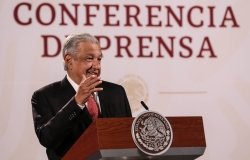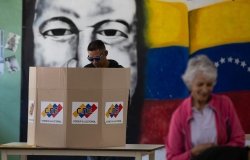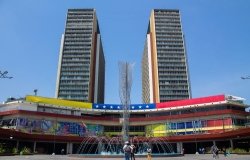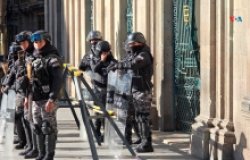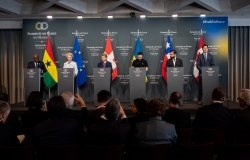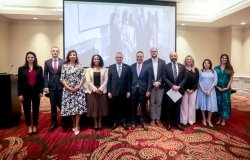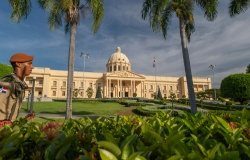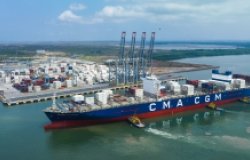
A blog of the Latin America Program
Et tu, Milei? Is Argentina Getting Closer to China Again?

Petrenko Andriy, Shutterstock
When Mauricio Macri was elected president of Argentina in 2015 as leader of the center-right coalition Cambiemos, he adopted a confrontational stance on China, distancing himself from the approach of his predecessor, Cristina Kirchner. He instead privileged relations with the United States and other Western powers to “reinsert Argentina into the world.” It did not last. By the end of his first year in office, Macri had signed a series of economic agreements with Beijing. By the end of his administration in 2019, China had consolidated its role as a strategic partner.
Similarly, Javier Milei came to the Casa Rosada skeptical about Argentina’s friendship with China. In his case, however, the libertarian leader also brought an ultra-ideological and personalistic approach to foreign policy that is unprecedented in recent Argentine history. In eight months in office, he has dragged Argentina into an ideological struggle against “decadent communists,” a list that variously includes Brazil, Colombia, Cuba, Mexico, Spain, Venezuela, and, of course, China. His strategy and style have led to clashes with his counterparts in Brasília, Bogotá, and Madrid.
By contrast, Milei has so far sidestepped a collision with Xi Jinping. In fact, in June, China extended its Central Bank line of credit to Argentina. But as expected, Argentina’s relationship with China is experiencing a notable stagnation, particularly in strategic areas of cooperation. For example, China’s main infrastructure investments in Argentina are paralyzed, with financing interrupted, while the volume of bilateral trade has gradually declined. In other sectors, such as lithium, progress generally reflects investments announced prior to Milei’s presidency.
It could get worse. Beijing’s most serious concern is signals by some of Milei’s close aides regarding Argentina’s approach to Taiwan, including a visit to Taipei in August by several lawmakers. Earlier, Foreign Minister Diana Mondino had reportedly met with Taiwan’s senior diplomat in Argentina, though she later denied the encounter and reiterated to Chinese Ambassador Wang Wei Argentina’s adherence to the One China principle. Milei also apparently irked China by downgrading military cooperation and in response to US concerns, ordering an inspection of a space complex in Neuquén province operated by the People’s Liberation Army. His approach to the US military is less distant; in April, he flew to Argentina’s southernmost province, Tierra del Fuego, to greet General Laura Richardson, commander of the Southern Command.
Beijing’s most serious concern is signals by some of Milei’s close aides regarding Argentina’s approach to Taiwan.”
Then again, there are signs that Milei might be reconsidering his approach to China, though out of necessity and not conviction. Milei, who has visited California, Florida, New York, and Washington since the election, has reportedly accepted Xi’s invitation to travel to Beijing. Meanwhile, a group of lawmakers, including representatives from Milei’s libertarian party, were invited to travel to China by the National People's Congress. In July, Milei’s sister and senior adviser, Karina, held a surprisingly friendly meeting with the Chinese ambassador in the Chinese Embassy.
This potential rapprochement reflects Argentina’s economic vulnerability and its dependence on Chinese investment, trade, and lending. But there is also another potential factor, apparent disappointment with the scale and speed of the US response to his dramatic realignment in Argentine foreign policy. Either way, just as occurred the last time a conservative led Argentina, it appears that China is once again establishing itself as an irreplaceable economic partner for Argentina.
About the Author


Latin America Program
The Wilson Center’s prestigious Latin America Program provides non-partisan expertise to a broad community of decision makers in the United States and Latin America on critical policy issues facing the Hemisphere. The Program provides insightful and actionable research for policymakers, private sector leaders, journalists, and public intellectuals in the United States and Latin America. To bridge the gap between scholarship and policy action, it fosters new inquiry, sponsors high-level public and private meetings among multiple stakeholders, and explores policy options to improve outcomes for citizens throughout the Americas. Drawing on the Wilson Center’s strength as the nation’s key non-partisan policy forum, the Program serves as a trusted source of analysis and a vital point of contact between the worlds of scholarship and action. Read more

Argentina Project
The Argentina Project is the premier institution for policy-relevant research on politics and economics in Argentina. Read more
